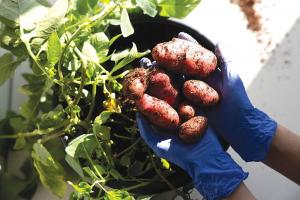2024 - Volume #48, Issue #6, Page #18
[ Sample Stories From This Issue | List of All Stories In This Issue | Print this story
| Read this issue]
Molecular Farming Transforms Potatoes Into Protein
 |
Its first protein target is ovalbumin or egg protein.
“There’s an urgent need for a steady supply of egg protein at a stable price,” says Maya Sapir-Mir, PoLoPo CEO. “Powdered egg protein is widely used in the food industry for functional reasons, like texture and stability, for enhancing nutritional value and extending shelf life. Food companies are dealing with price increases and supply chain disruptions, mainly because avian flu outbreaks have impacted the egg industry.”
Sapir-Mir and company co-founder Dr. Raya Liberman-Aloni devised the idea several years ago after working together in postdoctoral research.
They chose the potato because of its climate resiliency, low cost, high yields and large storage organs.
Sapir-Mir explains that molecular farming modifies plant genetics, so plants naturally generate a higher-value ingredient or nutrient, such as a protein, pigment, sugar or fatty acid. PoLoPo inserts a DNA sequence into the potato plant’s genome. When appropriately expressed in the proper tissue and at the right time (their proprietary science), the plant grows as a typical potato, producing the target protein in the tuber. The tubers are harvested, and the proteins are extracted using traditional processing lines before being dried into powder.
In May 2024, PoLoPo applied for a Regulatory Status Review in the U.S. They expect this to be granted by the end of 2024 when farming partners can begin growing the plants.
PoLoPo is currently completing testing and trials, talking to interested growers and processors, and actively looking for like-minded partners and service providers. They hope to work with potato experts, from seed/mini tuber producers to growers and processors interested in potato innovation and sustainability.
“We believe it’s practical and will be cost-effective,” Sapir-Mir says. “We’re about to reach pilot scale, and prices will inevitably fall as we expand to commercial growing. One could argue that producing ovalbumin in plants is more practical, cost-effective, and certainly more efficient than raising and feeding millions of hens to produce this specific ingredient. And we won’t have to break a single egg.”
Contact: FARM SHOW Followup, Ido Eliashar, VP of Business Development, PoLoPo, 3 Pinhas Sapir St., Ness Ziona, Israel (info@polopo.tech; www.polopo.tech).

Click here to download page story appeared in.

Click here to read entire issue
To read the rest of this story, download this issue below or click here to register with your account number.




